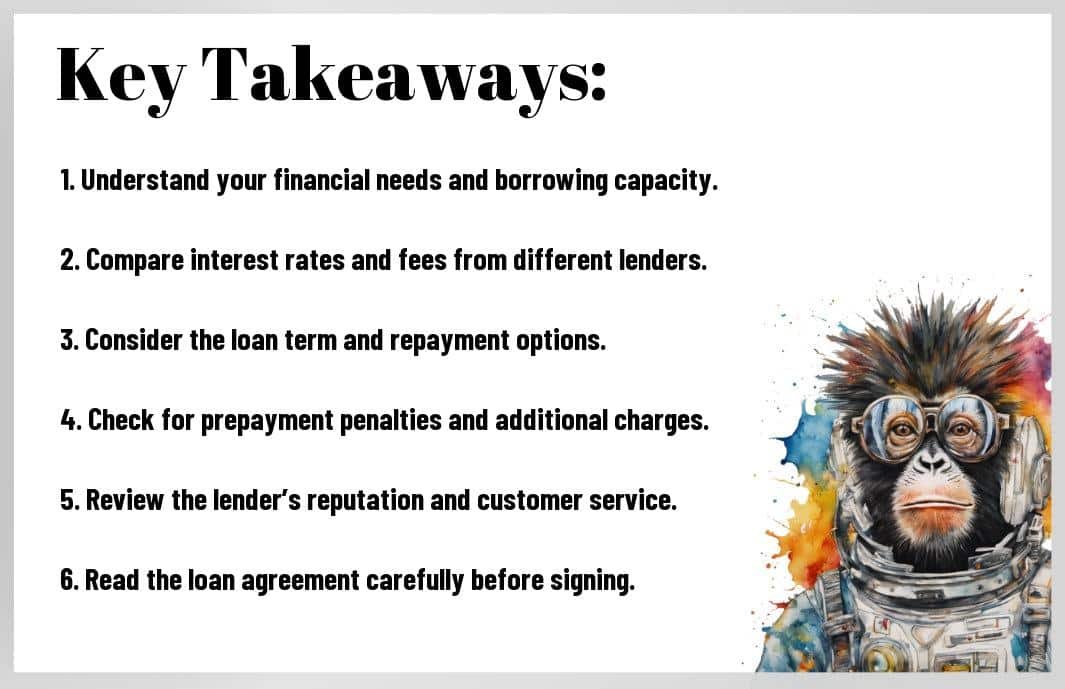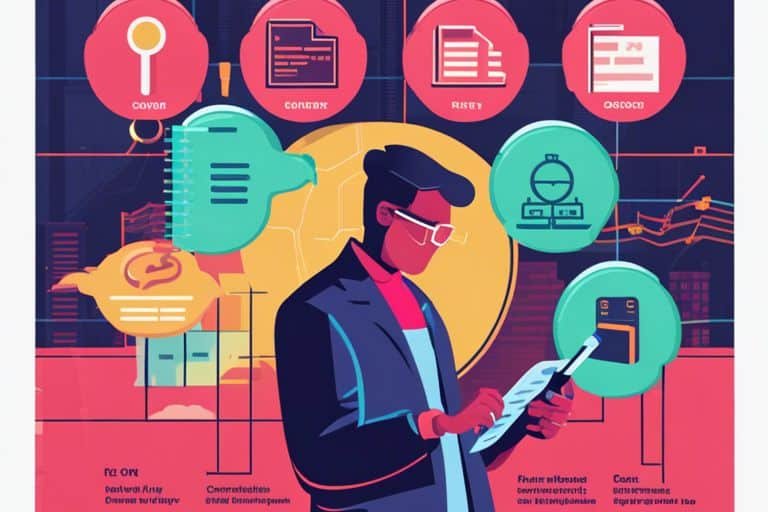The Ultimate Guide To Choosing The Best Personal Loan For Your Financial Needs

You’re on the hunt for the perfect personal loan, but where do you start? Let me tell you, this decision is not to be taken lightly. Choosing the right personal loan could mean the difference between financial freedom and drowning in debt. There are countless options out there, each with their own terms, interest rates, and fine print. In this ultimate guide, we are going to break it all down for you, so you can make an informed and strategic decision that will set you up for financial success. Let’s dive in and find the perfect personal loan for you.
Key Takeaways:
- Understanding Your Needs: It’s essential to assess your financial situation and determine the loan amount and terms that best suit your needs. Consider factors such as the purpose of the loan, your ability to repay, and the interest rate you can afford.
- Comparing Loan Options: Take the time to research and compare loan offers from different lenders. Look at the interest rates, repayment terms, and any additional fees associated with each option to find the best fit for your financial situation.
- Reading the Fine Print: Before committing to a personal loan, make sure to carefully read and understand the loan agreement, including all terms and conditions. Pay attention to any hidden fees, prepayment penalties, and the impact of late payments on your credit score.

Understanding Personal Loans: The Basics
Assuming you are in the market for a personal loan, it is crucial to understand the basics before diving in. Personal loans can be an excellent financial tool when used responsibly, but it’s important to grasp the fundamentals before making any decisions.
What Are Personal Loans and How Do They Work?
To put it simply, personal loans are a type of loan that allows you to borrow a fixed amount of money from a financial institution, and then repay it over a set period with interest. The interest rate can be fixed or variable, depending on the terms of the loan. Personal loans are typically unsecured, which means they do not require collateral, such as a car or house, as security.
Different Types of Personal Loans: Secured vs. Unsecured
The most common types of personal loans are secured and unsecured. Secured loans are backed by collateral, such as a car or savings account, which can be claimed by the lender if you fail to repay the loan. Unsecured loans, on the other hand, do not require collateral and are approved based on your creditworthiness.
- Secured loans require collateral
- Unsecured loans do not require collateral
- Secured loans have lower interest rates
- Unsecured loans are based on creditworthiness
- Secured loans are riskier for borrowers
With a clear understanding of the types of personal loans and how they work, you can make an informed decision on the best option for your financial needs. Perceiving the differences between secured and unsecured loans can help you choose the one that aligns with your financial goals and capabilities.

Assessing Your Financial Health: Pre-Loan Checklist
Not sure if you’re financially ready for a personal loan? Don’t worry, I’ve got your back. Before you dive into the world of personal loans, you need to take a step back and assess your financial health. The Ultimate Guide to Personal Loans will walk you through the essential steps to make sure you’re making the right decision for your financial future.
Knowing Your Credit Score and Why It Matters
Health is wealth, my friend. Your credit score is a reflection of your financial health. Lenders will use this little number to determine if you’re a risky bet or a reliable borrower. A higher credit score opens doors to lower interest rates and better loan terms, while a low credit score can cost you big time. Don’t stress though, there are ways to improve your credit score and I’ll show you how in this guide.
Furthermore, a healthy credit score gives you the power to negotiate better loan deals and access to a wider range of personal loan options. Keep an eye on your credit score and take the necessary steps to boost it before diving into the personal loan game.
Your Income and Debt: Calculating What You Can Afford
One of the most important factors in determining your financial readiness for a personal loan is your income and existing debt. Your income gives lenders an idea of how much you can afford to repay each month, while your current debt obligations show them how well you manage your finances. It’s crucial to have a healthy balance between your income and debt to avoid getting in over your head with a personal loan.
Credit utilization ratio, debt-to-income ratio, and residual income are important factors to consider before landing the best personal loan deal. Knowing these numbers will help you make an informed decision and avoid potential financial pitfalls down the line.
For instance, if your credit utilization ratio is high and your debt-to-income ratio is pushing the limit, it might be a wise move to focus on improving these numbers before applying for a personal loan. By optimizing your financial health, you’ll be in a stronger position to secure the best personal loan for your needs. Remember, the goal is to set yourself up for success, not to add more financial stress to your life. So, take a step back, assess your financial health, and make sure you’re ready to rock the personal loan game.
Finding the Right Lender: Navigating the Sea of Options
Keep your seatbelts fastened because we’re about to dive into the wild world of personal loan options. With so many lenders out there, finding the right one can feel like searching for a needle in a haystack. But fear not, I’ve got your back. Let’s break it down and find the perfect match for your financial needs.
Banks vs. Credit Unions vs. Online Lenders: Pros and Cons
The battle of the lenders is on! The decision between choosing a bank, credit union, or online lender can be a tough one. Each option comes with its own set of pros and cons, and it’s crucial to weigh them carefully. Here’s a breakdown to help you make the right choice:
| Banks | Credit Unions |
| Pros: Convenience, Reputation, Physical Locations | Pros: Lower Fees, Personalized Service, Community-Oriented |
| Cons: Higher Interest Rates, Strict Requirements | Cons: Limited ATM/branch access, Membership Criteria |
| Online Lenders | |
| Pros: Speed, Accessibility, Competitive Rates | |
| Cons: Potential for Scams, Lack of In-Person Support |
The Importance of Shopping Around
Options are everything when it comes to finding the best personal loan. Don’t settle for the first offer that comes your way. Take the time to explore multiple lenders to compare interest rates, terms, and fees. Whether it’s a bank, credit union, or online lender, you want to cast a wide net and dig deep to find the most flexible and affordable option for your needs.
With the wealth of information available online, it’s easier than ever to research and compare lenders without even leaving your couch. This powerful tool can help you uncover hidden gems and avoid potential pitfalls in the personal loan landscape.
Reading the Fine Print: Fees and Penalties
Fees and penalties are the fine print you can’t afford to overlook when choosing a personal loan. Some lenders sneak in hidden fees or hefty penalties for early repayment that could catch you by surprise. Be sure to read through the terms with a fine-tooth comb and make sure you understand every detail before signing on the dotted line.
Shopping around isn’t just about comparing interest rates. It’s also about uncovering any potential traps or pitfalls in the form of hidden fees or harsh penalties. Don’t let these sneaky terms come back to haunt you down the line – do your due diligence and protect yourself from unnecessary financial surprises.
Interest Rates Demystified: Getting the Best Deal
Unlike other aspects of personal finance, interest rates can be confusing and overwhelming. But fear not, because in this chapter, we’re going to demystify interest rates and help you understand how to get the best deal when shopping for a personal loan. By the end of this chapter, you’ll be armed with the knowledge and confidence to make a savvy financial decision that suits your needs.
How Interest Rates Work and Factors That Affect Them
An interest rate is the cost of borrowing money, expressed as a percentage. It is influenced by a number of factors, including credit score, loan term, and the lender’s assessment of your credit risk. Other factors, such as inflation and the economic environment, can also impact interest rates. Recognizing these factors and understanding how they affect interest rates can help you make informed decisions when comparing loan offers.
Fixed vs. Variable Rates: Choosing What’s Best for You
One of the key decisions you’ll need to make when selecting a personal loan is whether to opt for fixed or variable interest rates. A fixed-rate loan offers predictable monthly payments and protection from interest rate hikes, while a variable-rate loan can provide an opportunity to benefit from interest rate decreases. Each option has its pros and cons, so it’s important to carefully consider your financial situation and goals before making a decision.
A fixed rate provides stability and peace of mind, while a variable rate offers the potential for cost savings if interest rates decrease. When choosing between these two options, it’s crucial to assess your financial flexibility and risk tolerance to determine which type of interest rate aligns with your needs and preferences.
Negotiating Lower Rates: Tips and Tricks
Best way to secure the most favorable interest rate is to negotiate with potential lenders. Here are some tips and tricks to help you lower your interest rate and save money on your personal loan:
- Shop around and compare offers from multiple lenders to leverage competitive rates.
- Improve your credit score to demonstrate creditworthiness and qualify for lower rates.
- Consider a cosigner with strong credit to increase your chances of securing a lower rate.
The key to successfully negotiating lower interest rates is to empower yourself with knowledge and be proactive in seeking the best possible deal. Don’t be afraid to advocate for yourself and explore opportunities to lower your borrowing costs.
The Application Process: Steps to Success
Now that you’ve made the decision to take out a personal loan, it’s time to dive into the application process. This can seem intimidating, but with the right approach, you can set yourself up for success and secure the funding you need.
Preparing Your Documentation: What You Need
Any successful personal loan application starts with gathering the necessary documentation. This typically includes proof of income, identification, and financial statements. Lenders want to see that you have a stable income and are capable of repaying the loan. By preparing these documents in advance and ensuring they are accurate and up to date, you can streamline the application process and increase your chances of approval.
When applying for a personal loan, it’s essential to be organized and thorough when presenting your documentation. This demonstrates to lenders that you are a responsible borrower and increases their confidence in your ability to manage the loan.
Applying for a Personal Loan: Online vs. In-Person
Preparing to apply for a personal loan involves deciding whether to go the traditional route of visiting a bank or credit union in person or using the convenience of online applications. Online applications offer speed and convenience, often providing pre-qualification within minutes. In-person applications, on the other hand, allow for face-to-face interaction and the opportunity to ask questions directly to a loan officer.
Steps to success in choosing whether to apply online or in person involve considering your comfort level with technology, the urgency of your financial need, and your preference for personal interaction. It’s important to weigh these factors to determine which application method aligns best with your financial situation and individual preferences.
What to Do If You’re Rejected
What should you do if your personal loan application is rejected? First and foremost, don’t panic or give up. Take the rejection as an opportunity to improve your financial standing and address any potential issues that may have led to the denial. Reach out to the lender to gain clarity on the reasons for the rejection and work on rectifying any issues before reapplying.
If you are facing rejection, consider alternative lenders or explore options such as credit building and debt consolidation. Building a positive credit history and improving your financial standing can increase your chances of approval in the future.
Managing Your Personal Loan: Strategies for Financial Freedom
After securing a personal loan, the next step is to manage it effectively in order to achieve financial freedom. By implementing smart strategies, you can take control of your loan and work towards paying it off efficiently while still enjoying your life.
Setting Up a Repayment Plan That Works for You
To take charge of your personal loan, it’s crucial to set up a repayment plan that aligns with your financial situation and lifestyle. Assess your income, expenses, and other financial obligations to determine how much you can afford to pay towards your loan each month. Whether you prefer making monthly, bi-weekly, or weekly payments, choose a schedule that works best for you to avoid missing payments and incurring unnecessary fees. By creating a realistic repayment plan, you can stay on track and make consistent progress towards becoming debt-free.
Strategies for Paying Off Your Loan Early
Financial freedom is within your reach when you take proactive steps to pay off your personal loan ahead of schedule. By making additional payments whenever possible, you can reduce the principal amount and minimize the interest accrued over time. Consider allocating windfalls, such as tax refunds or work bonuses, towards your loan to accelerate the repayment process. Additionally, cutting back on discretionary expenses and finding ways to increase your income can free up more money to put towards your loan, bringing you one step closer to complete financial freedom.
Loan Paying Off, Financial Freedom, Personal Loan, Strategies, Repayment Plan, Setbacks, Setting
Dealing with Financial Setbacks: Adjusting Your Plan
Setbacks are a natural part of the financial journey, and it’s essential to adapt your repayment plan when facing unexpected challenges. Whether it’s a job loss, medical emergency, or a major repair expense, unforeseen circumstances can impact your ability to stick to your original plan. In such situations, communicate with your lender to explore alternative payment arrangements or hardship options that can provide temporary relief. By adjusting your plan accordingly and staying proactive, you can navigate through setbacks and continue progressing towards your goal of financial freedom.
Setting, Financial Setbacks, Adjusting, Repayment Plan, Strategies
Beyond the Loan: Maintaining Financial Health
To truly make the most out of your personal loan and set yourself up for long-term financial success, you need to go beyond just paying off the loan. Here are some key strategies for maintaining your financial health post-loan:
On Building and Protecting Your Credit Score Post-Loan
After successfully paying off your personal loan, it’s crucial to continue building and protecting your credit score. One way to do this is by making sure you pay all your bills on time and in full. Additionally, try to keep your credit utilization low, ideally below 30% of your available credit. Regularly monitoring your credit report for any errors or suspicious activity is also critical in safeguarding your credit score.
Another way to boost your credit score is by diversifying your credit mix. Taking on different types of credit, such as a credit card or a mortgage, shows lenders that you can responsibly manage various forms of debt. By staying on top of these factors, you can continue to strengthen your credit score post-loan.
Financial Leveraging Your Loan for Future Financial Success
Financial success doesn’t end with paying off your personal loan. You can actually leverage your loan to propel yourself further. Consider using the funds from your loan to invest in opportunities that can help grow your wealth, such as starting a side business or investing in stocks. By strategically allocating the funds from your loan, you can potentially generate additional income and expand your financial portfolio.
Loan repayment success can also open doors to new financial opportunities, such as qualifying for larger loans with lower interest rates in the future. This can be especially beneficial if you are looking to purchase a home or fund a major investment. By leveraging your loan as a stepping stone, you can set yourself up for greater financial success down the road.
Leveraging your personal loan for smart investments or to access more favorable financial products can accelerate your journey to financial freedom and wealth accumulation.
When to Consider Another Loan
Score a stable credit score, have successfully paid off your previous loan, and find yourself in a position where taking on more debt will further your financial goals, it could be the right time to consider another loan. Whether it’s for investing in property, expanding your business, or pursuing additional education, a well-timed loan can be a strategic move for achieving your future financial aspirations.

Conclusion
Summing up, choosing the best personal loan for your financial needs is a critical decision that requires careful consideration. By following these tips and doing your homework, you can find the right loan that fits your unique situation and helps you achieve your financial goals. Remember to shop around, read the fine print, and stay disciplined with your payments to make the most of your personal loan.
Ultimately, the best personal loan is the one that aligns with your financial goals, offers a competitive interest rate, and has flexible terms. It’s all about being proactive, educated, and strategic when making this important financial decision. With the right personal loan, you can take control of your finances and work towards a brighter financial future.
Also Read : The Pros And Cons Of Choosing A Personal Loan Over Other Financing Options
FAQs
Q: What is a personal loan?
A: A personal loan is a type of unsecured loan that helps you meet your current financial needs. It can be used for various purposes such as debt consolidation, home improvement, or unexpected expenses.
Q: How do I choose the best personal loan for my financial needs?
A: To choose the best personal loan, consider factors such as the interest rate, repayment terms, fees, and your credit score. Compare offers from multiple lenders to find the most suitable option for your needs.
Q: What is the importance of comparing interest rates for personal loans?
A: Comparing interest rates is crucial as it directly impacts the overall cost of the loan. A lower interest rate can save you money in the long run, so it’s essential to find a competitive rate that fits your financial situation.
Q: What are the common fees associated with personal loans?
A: Common fees include origination fees, prepayment penalties, and late payment fees. It’s important to understand these fees and factor them into your decision when choosing a personal loan.
Q: How does my credit score affect my ability to get a personal loan?
A: Your credit score plays a significant role in determining your eligibility for a personal loan and the interest rate you’ll receive. Maintaining a good credit score can increase your chances of securing a favorable loan offer.
Q: What are the repayment terms for personal loans?
A: Repayment terms vary by lender but typically range from 12 to 84 months. It’s important to choose a loan with repayment terms that align with your financial goals and budget.
Q: Can I use a personal loan for debt consolidation?
A: Yes, personal loans can be used for debt consolidation to combine multiple debts into a single, more manageable loan. This can potentially save you money on interest and simplify your repayment process.




